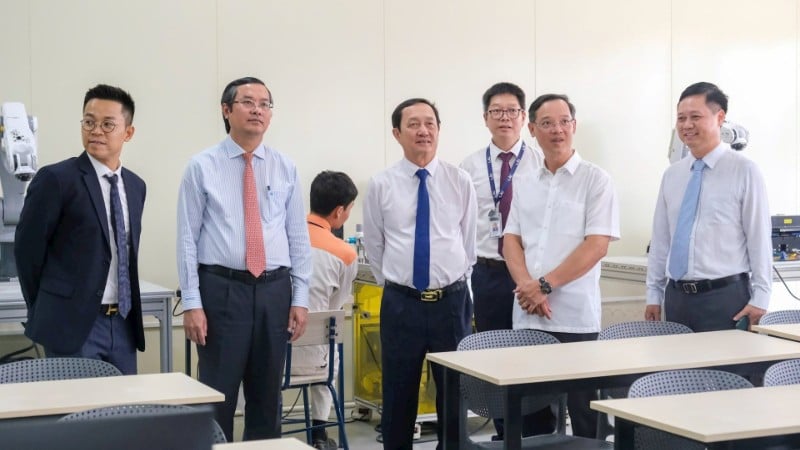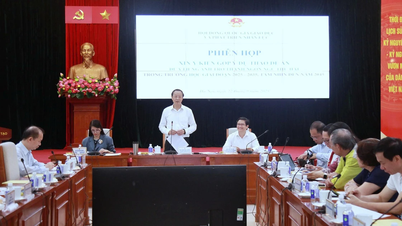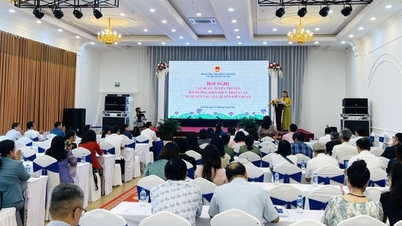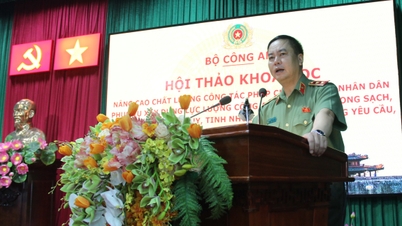
Currently, the issue that vocational training institutions are waiting for, along with autonomy, is a real accountability mechanism to become a driving force to improve quality and strengthen social trust.
Accountability is indispensable.
The scientific workshop "Orientation of autonomy and accountability in vocational training institutions" organized by the Central Propaganda and Mass Mobilization Commission in coordination with the Ministry of Education and Training in Bac Ninh recently clarified the relationship between autonomy and accountability.
Associate Professor, Dr. Huynh Thanh Dat, member of the Party Central Committee, Deputy Head of the Central Propaganda and Mass Mobilization Commission, emphasized: “Autonomy is not only limited to finance but also includes academics, personnel and organization, must go hand in hand with accountability, information transparency and social engagement”. This is a prerequisite for vocational education to affirm its position and meet the demand for high-quality human resources in the new context.
Autonomy is not limited to finance but also includes academic, human and organizational aspects, and must go hand in hand with accountability, information transparency and social engagement.
Associate Professor, Dr. Huynh Thanh Dat,
Member of the Party Central Committee,
Deputy Head of the Central Propaganda and Mass Mobilization Commission
Autonomy and accountability are two inseparable aspects. Mr. Truong Anh Dung, Director of the Department of Vocational Education and Continuing Education, analyzed: Autonomy creates flexibility in programs, organization, and finance, but without accountability and transparency, it is easy to fall into formality and even lose quality control. Therefore, it is necessary to soon have an independent inspection mechanism, financial transparency, output standards, and employment rates.
Sharing the same viewpoint and from a grassroots perspective, Associate Professor, Dr. Nguyen Tien Dong, Principal of Ly Thai To College - the host of the conference, stated that autonomy is not only a right but also a responsibility... and only when the entire education system acts together, the spirit of Resolution No. 71-NQ/TW can truly come into life. International experience from Germany, Singapore, and South Korea also shows that success comes from strong empowerment combined with close supervision and objective external assessment. Vietnam is recommended to build an independent assessment system and standardize the legal framework to ensure real autonomy and avoid "half-hearted" situations.
The overview of vocational education from 2020 to 2024 has been showing many positive signs: The entire vocational education system has enrolled more than 10.8 million people (936 thousand colleges; 1.3 million intermediate; 8.5 million elementary and continuing training), contributing to raising the rate of workers with degrees and certificates to 28.3% by 2024. More than 80% of graduates have jobs, some schools are closely linked to businesses, reaching 100%, with 85-90% of them in the right major. Notably, according to the World Economic Forum, Vietnam's vocational training quality index in 2023 increased by 8 levels, reaching 4.82/7 points, exceeding the target assigned by the Government; in ASEAN, Vietnam ranked in the top 4, after Singapore and Indonesia.
Despite remarkable achievements, challenges still exist for vocational education in Vietnam. Currently, many institutions are still dependent on the state budget, few schools have achieved full autonomy; enrollment is difficult, tuition fees are low, the training ordering mechanism is not flexible; the connection between the state, schools and enterprises is not tight. These limitations make many schools confused when they have to balance their own finances, lack resources to invest in equipment and technology.
Positive figures on enrollment, employment, and international status show that vocational education is transforming strongly, but the reality of budget dependence, enrollment difficulties, and governance limitations shows a paradox: If autonomy is only expanded without accountability, the system can easily fall into formality and lose quality control. Therefore, Resolution No. 71-NQ/TW focuses on empowering along with independent monitoring mechanisms, data transparency, and real accountability. This is not only a governance principle, but also a “filter” for vocational education to build social trust, creating a foundation for sustainable development.
Vocational education needs to avoid formal autonomy.
According to managers and those who operate in the field of vocational education, if we want to be truly autonomous, we must turn the spirit of Resolution No. 71-NQ/TW of the Politburo into synchronous action. Education expert Pham Do Nhat Tien emphasized: “To be truly accountable, each vocational education institution needs to publish its KPI system and annual targets, linked to financial reports and digitalized management data. Accountability must be verified by specific results in terms of finance, training quality and employment of learners.”
To be truly accountable, each vocational training institution needs to publish its KPI system and annual targets, linked to financial reports and digital management data. Accountability must be verified by specific results in terms of finance, training quality and student employment.
Education expert Pham Do Nhat Tien
The practical operation of public and non-public vocational training institutions shows that it is necessary to build a culture of accountability in vocational schools, publicize employment data and training quality for social monitoring. At the same time, schools need to be flexible in adjusting programs, linking and cooperating with units and businesses to create practice facilities right at the school, creating conditions for learners to practice their profession.
It can be seen that creating conditions for vocational education institutions to be fully and comprehensively autonomous must always be associated with accountability, which is the foundation for building an open, flexible, modern and integrated vocational education system. This is both a governance principle and a “filter” for vocational education to build social trust and needs to be concretized by actions with a clear legal framework, a modern governance model, a culture of transparency and an independent control mechanism. Without accountability, autonomy will become a formality; but when these two factors operate synchronously, vocational education will truly become a pillar of human resources in the new development stage of the country.
Source: https://nhandan.vn/tu-chu-va-trach-nhiem-giai-trinh-trong-doi-moi-giao-duc-nghe-nghiep-post909602.html



![[Photo] Prime Minister Pham Minh Chinh chairs the first meeting of the Central Steering Committee on housing policy and real estate market](https://vphoto.vietnam.vn/thumb/1200x675/vietnam/resource/IMAGE/2025/9/22/c0f42b88c6284975b4bcfcf5b17656e7)



















![[Photo] Prime Minister Pham Minh Chinh chairs the first meeting of the Central Steering Committee on housing policy and real estate market](https://vphoto.vietnam.vn/thumb/402x226/vietnam/resource/IMAGE/2025/9/22/c0f42b88c6284975b4bcfcf5b17656e7)



![[Photo] General Secretary To Lam presents the First Class Labor Medal to the Vietnam National Energy and Industry Group](https://vphoto.vietnam.vn/thumb/1200x675/vietnam/resource/IMAGE/2025/9/21/0ad2d50e1c274a55a3736500c5f262e5)
































































Comment (0)